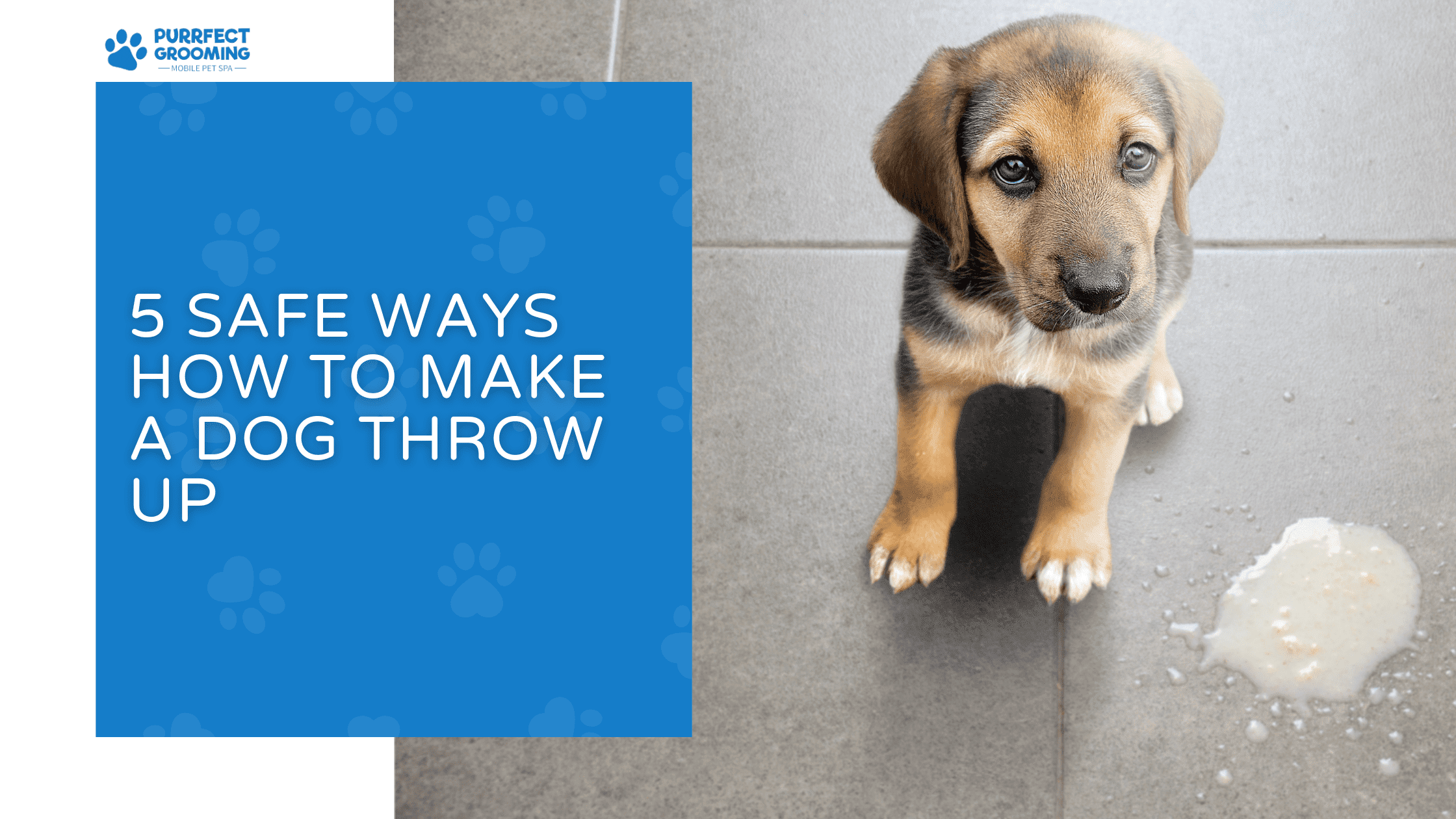5 Safe Ways How to Make a Dog Throw Up
Ever come home to find your dog chewing on a suspicious item? Maybe some chocolate, a sock, or even a random pill? If you’re searching for how to make a dog throw up, or wondering how to make my dog throw up safely, you’re not alone. Many pet parents panic when their furry friend swallows something they shouldn’t. Thankfully, in certain cases, inducing vomiting in dogs can prevent serious health issues — or worse.
👉 Fact: According to the American Society for the Prevention of Cruelty to Animals (ASPCA), over 232,000 cases of pet poisoning are reported annually in the U.S. alone, with food, medications, and household items being the top culprits.
This article will guide you through when and how to make a dog vomit safely using methods approved by vets, what tools you’ll need, when not to try it, and what to do next.
Why Would You Need to Make Your Dog Vomit?
Sometimes, dogs swallow things that can be downright dangerous — chocolate, grapes, prescription pills, cleaning products, or even a sock. In such situations, the faster you act, the better your dog’s chances of staying healthy. Vomiting helps eliminate harmful substances before they get fully absorbed into your pup’s system.
Warning: When NOT to Induce Vomiting in Dogs
You should never try to induce vomiting if:
- The dog is unconscious, having seizures, or too weak to stand.
- The dog swallowed caustic substances like bleach or drain cleaner.
- Your vet says not to based on what was ingested.
- It’s been more than 2 hours since ingestion.
Trying to make a dog vomit under these conditions can lead to aspiration pneumonia, esophageal damage, or even death.
Quick Stat: Common Household Toxins Affecting Dogs
| Toxin | Common Source | Danger Level |
| Chocolate | Candy, baked goods | High |
| Ibuprofen | Human medicine | Very High |
| Xylitol | Sugar-free gum, candy | Extreme |
| Grapes & Raisins | Snacks, baked goods | Kidney failure risk |
| Bleach | Cleaning supplies | Life-threatening |
Overview of What You’ll Learn
- Safe, step-by-step ways to make your dog vomit.
- When it’s okay to do it at home — and when it’s not.
- How to recognize symptoms that require a vet ASAP.
- Emergency tools every pet parent should keep handy.
When to Induce Vomiting in Dogs
Timing is everything. You usually have a 30-minute to 2-hour window from the time of ingestion to safely induce vomiting.
Symptoms That Call for Immediate Action
- Sudden vomiting or gagging
- Pawing at the mouth
- Excessive drooling
- Lethargy or unusual behavior
If these symptoms show up, don’t waste time — call your vet immediately.
5 Safe Methods to Make a Dog Throw Up
Let’s break down the most commonly recommended techniques — what works, what doesn’t, and how to use them responsibly.
1. Hydrogen Peroxide (3%) – The Vet-Approved Method
Hydrogen peroxide is the only over-the-counter method most vets approve of for inducing vomiting at home. It irritates the stomach lining and triggers vomiting within 10–15 minutes.
Dosage Instructions by Weight
| Dog’s Weight | Hydrogen Peroxide Dosage |
| Under 10 lbs | 1 teaspoon |
| 10–30 lbs | 1–2 teaspoons |
| 30–60 lbs | 2–3 teaspoons |
| Over 60 lbs | Max 3 tablespoons |
Important: Never use more than 3 tablespoons regardless of size.
Step-by-Step Guide
- Use a syringe or turkey baster to squirt the hydrogen peroxide toward the back of the dog’s mouth.
- Hold your dog’s head gently but firmly.
- Wait 10–15 minutes.
- If no vomiting occurs, you may administer one more dose, but do NOT repeat a third time.
What to Expect
- Vomiting should occur within 15 minutes.
- Your dog might foam at the mouth — this is normal.
- Always follow up with your vet.
2. Mustard and Water Mix – Natural Option
While less effective than hydrogen peroxide, some pet owners use a mix of 1 tablespoon of mustard in a half cup of water.
How It Works
- Mustard acts as a mild irritant to the stomach lining.
- It’s sometimes used when peroxide isn’t available.
Potential Side Effects
- Upset stomach
- Diarrhea
- Not as reliable — results vary greatly by dog
3. Manual Stimulation – NOT Recommended
Yes, some guides mention triggering vomiting manually, but it’s dangerous and rarely successful.
Why You Shouldn’t Try This
- Risk of injury to the throat or mouth
- High stress for the dog
- Can cause choking or aspiration
Always leave manual methods to licensed veterinarians.
4. Salt Water – Outdated and Risky
This was once a go-to, but it’s now strongly discouraged by vets.
Why Vets Say No
- Can cause salt poisoning
- Leads to seizures, coma, or even death
- Not worth the risk — skip this one
5. Vet-Administered Vomiting Agents (Apomorphine)
This is your best bet when you’re unsure or when home remedies fail.
What Is Apomorphine?
- A powerful injectable medication that triggers vomiting.
- Available only by prescription and used under clinical supervision.
Why It’s Better
- More controlled
- Works faster
- Zero guesswork

Step-by-Step Chart – What to Do If Your Dog Eats Something Toxic
| Action | Timeframe | Tools Needed | Notes |
| Identify what was eaten | ASAP | None | Secure any packaging |
| Call vet or poison control | Within 5 mins | Phone | ASPCA: 888-426-4435 |
| Induce vomiting (if told) | Within 30 mins | Hydrogen Peroxide | Only if vet-approved |
| Monitor symptoms | 1–2 hours | Thermometer | Check for worsening |
| Visit vet | Same day | Toxin details | Essential for follow-up |
Situations Where You Should NEVER Induce Vomiting
Sharp Objects or Caustic Substances
Items like needles, bones, or cleaning supplies can do more harm on the way back up.
Unconscious or Seizing Dog
Vomiting can cause choking or aspiration in these cases.
At-Risk Breeds
Flat-faced breeds like pugs and bulldogs are more prone to aspiration pneumonia.
What to Do After Inducing Vomiting
- Offer your dog some fresh water.
- Avoid feeding for the next 6–12 hours.
- Watch for signs of dehydration or distress.
- Schedule a vet visit to ensure no internal damage.
Tools and Supplies You Should Have in a Pet First Aid Kit
| Item | Why You Need It |
| Hydrogen Peroxide (3%) | Induces vomiting |
| Syringe / Dropper | Accurate dosing |
| Activated Charcoal | Absorbs toxins |
| Vet Contact Card | Emergency reach |
| Thermometer | Monitor changes |
Vet Advice and Professional Insight
According to the American Kennel Club (AKC), making your dog vomit without a vet’s guidance can be more dangerous than the toxin itself. It’s always better to get advice from a pet poison hotline or your veterinarian.
AKC’s Tip: Never assume a home remedy is safe — even natural ones.
Common Myths About Making Dogs Vomit
| Myth | Truth |
| Milk helps with toxins | It can make things worse |
| Vinegar induces vomiting | Not effective and may cause harm |
| Dogs will vomit on their own | Not always true — toxins can work fast |
| Social media hacks are safe | Many are dangerous and outdated |
Final Thoughts
Dealing with a poisoning scare is every pet owner’s nightmare. But knowing exactly how to make a dog throw up — safely and correctly — can be the difference between a close call and a tragedy. Always keep emergency supplies ready, stay calm, and when in doubt, call the vet. Prevention is the best medicine, but preparation is the next best thing.
Pro Tip Before You Go
Keep a “Pet Emergency Card” in your wallet and on your fridge. List your dog’s weight, allergies, and vet’s number. In an emergency, that little card can save precious minutes — and possibly your dog’s life.
FAQs
1. How long after ingestion can I make my dog throw up?
Up to 2 hours, but the sooner the better. After 30–60 minutes, absorption may have already begun.
2. Can I use table salt to make my dog vomit?
No. Salt can lead to salt toxicity, seizures, or even death.
3. Is it safe to use hydrogen peroxide more than once?
You can try a second dose after 15 minutes if the first fails. Never give a third.
4. What should I do if vomiting doesn’t happen?
Contact your vet immediately. Your dog may need medical help or professional vomiting agents.
5. What are the signs that my dog needs emergency care?
Difficulty breathing, seizures, or collapse are red flags. Go to the emergency vet now.
